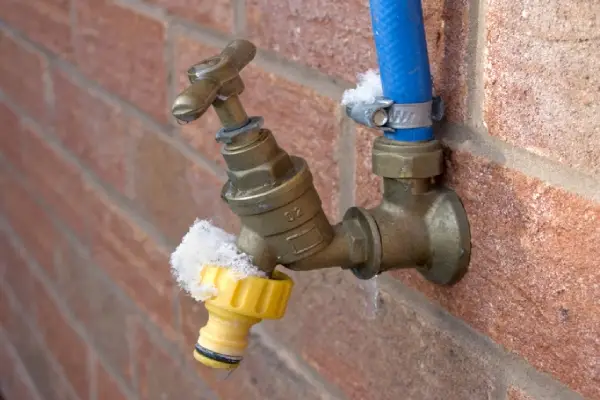
As the chill sets in around Prescott Valley, getting your plumbing ready for winter goes beyond just wrapping exposed pipes and turning off outdoor faucets. There are some commonly missed tasks that can save you from major plumbing problems and expensive repairs when the cold really hits.
Our team at Mr. Rooter Plumbing of Yavapai, Coconino and Maricopa Counties offers 10 often-overlooked plumbing winterization tasks to help you stay ahead this season.
1. Locate and Label Your Sewer Line Clean-Outs
Many homeowners forget about sewer clean-outs, but these are vital for resolving backups, especially in freezing weather. Find and clearly label these access points around your home so plumbers can reach them quickly, even if snow piles up. Staying on top of clean-out maintenance before winter reduces the chances of slow drains, backups, and expensive repair bills.
2. Check and Clear Water Meter Access
Your water meter needs to be clear year-round, no matter how much snow or debris piles up. A clear path means utility workers or emergency staff can easily read or shut off your water if necessary. Insulating the meter with an old blanket, mulch, or a breathable container can protect it from freezing without blocking access when time is critical.
3. Seal Gaps and Cracks in Your Home’s Exterior
Cold drafts sneaking in through small cracks near your foundation, windows, or doors can chill your pipes from the outside. Use caulk or expanding foam to seal and help maintain steady indoor temperatures and protect plumbing lines. Don’t forget to check where cables, pipes, or utility lines enter your house—these are prime spots for drafts.
4. Insulate Garage Doors, Basement Windows, and Crawlspace Vents
These areas don’t usually have much natural insulation, leaving your plumbing exposed to freezing cold. Slapping on some insulation or even temporary coverings can really cut down on those chilly drafts and keep your pipes from getting too cold. Whether it’s foam pipe sleeves, fiberglass wraps, or reflective foil, using the right materials helps keep the temperature steady around your pipes in garages, crawlspaces, or basements.
5. Use Proper Pipe Insulation Materials
Avoid wrapping pipes in towels or cotton rags, which absorb moisture and can freeze faster. Instead, apply foam pipe insulation sleeves or fiberglass wraps designed specifically for plumbing protection to maintain pipe warmth and prevent bursting. You should also consider using heat tape or heat cables on especially vulnerable pipes for an extra layer of freeze protection during prolonged cold snaps.
6. Flush and Insulate Your Water Heater
Draining sediment from the bottom of your water heater tank improves efficiency and prevents corrosion damage. Adding an insulating jacket around your heater helps maintain water temperature and reduces freezing risks to water supply lines connected to the heater. This layer of insulation can also lower your energy costs by reducing heat loss, meaning your water heater doesn’t have to work as hard to keep water warm.
7. Open Cabinet Doors Near Plumbing Fixtures
Leaving cabinet doors under sinks and other plumbing fixtures open during cold spells allows warmer room air to circulate around vulnerable pipes, reducing the chance of freeze damage. This simple step can raise the temperature inside the cabinet by several degrees compared to keeping doors closed, helping to prevent water inside the pipes from freezing. Just be sure to keep any cleaners or chemicals stored inside the cabinets out of reach of children and pets when the doors are open.
8. Fully Drain and Insulate Outdoor Faucets
Disconnect garden hoses and drain outdoor spigots completely. Wrap faucets with foam covers or insulated socks to protect against frost. If possible, shut off the water supply valves to outside taps from inside your home. After turning off the water supply valve, opening your outdoor faucet allows any remaining water to drain out of the pipes. This step reduces the potential of water freezing inside, which helps prevent pipes from bursting during cold weather.
9. Allow Faucets to Drip When Temperatures Plummet
A slow trickle from faucets reduces pressure in pipes, preventing freezing and potential bursts during severe cold snaps. Target taps connected to exterior pipes or plumbing near outer walls. Even a small amount of moving water helps prevent ice from forming by relieving pressure buildup that may cause pipe damage if it freezes solid. This method works best when combined with correct insulation and maintaining a consistent indoor temperature.
10. Prepare Emergency Plumbing Contacts
Have your trusted plumber’s phone number readily available. Quick access to professional help minimizes damage if freezing, bursts, or leaks occur despite your best precautions. Many plumbing companies, including emergency services, offer 24/7 availability to respond promptly to urgent situations, helping reduce costly water damage and restore your system quickly. Knowing you have expert support on call can provide peace of mind during the coldest months.
Why These Tasks Matter
While most people cover obvious winterization steps, these less obvious preparations create an added layer of protection against winter’s harsh effects. Together, they lower the risk of bursts, leaks, costly repairs, and water damage—saving you stress and money.
Take a Proactive Approach This Winter
Being thorough about your plumbing winterization non-negotiables safeguards your home and your family’s comfort. Incorporate these lesser-known tasks into your seasonal routine alongside pipe wrapping and valve checks for truly comprehensive coverage.
If you have questions or need help winterizing your home plumbing in Prescott Valley, Mr. Rooter Plumbing of Yavapai, Coconino and Maricopa Counties is here to assist with expert advice and reliable service.
Contact us today to schedule service.

